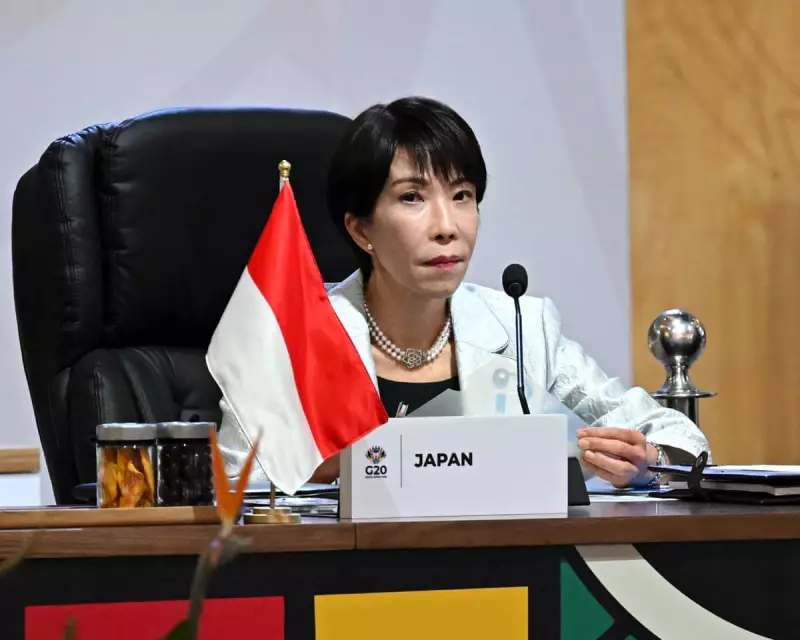
Japan's Prime Minister Sanae Takaichi returned empty-handed from the G20 summit in Johannesburg after failing to secure a breakthrough in her country's escalating diplomatic row with China.
Frosty Encounters at G20
The Japanese leader, who had carefully selected her summit wardrobe to give her the upper hand in negotiations, never got the opportunity to test her theory in what would have been her most pressing engagement - talks with Chinese Premier Li Qiang.
Instead, the two leaders maintained a conspicuous distance during Saturday's group photoshoot, setting a frosty tone that persisted throughout the summit. This occurred despite earlier speculation that at least a brief handshake and exchange of courtesies might be possible between the northeast Asian neighbours.
The Taiwan Comments That Changed Everything
The diplomatic chill follows comments made by Takaichi two weeks earlier that infuriated Beijing. The conservative leader suggested that Japanese military intervention would be justified should China attempt to invade Taiwan.
Speaking to reporters at the summit's conclusion on Sunday, Takaichi - known for her hawkish views on China - insisted that the door to dialogue remains open. She repeated the cordial language from her meeting with Chinese leader Xi Jinping at the Apec summit in South Korea less than a month ago, calling for a return to mutual understanding and cooperation.
However, she notably refused to meet Beijing's main condition for ending the dispute - retracting her assertion about collective self-defence regarding Taiwan. Takaichi had argued this month that Japan would be entitled to engage in such measures if an emergency in the Taiwan Strait created a survival-threatening situation for Japan.
Economic and Cultural Fallout
While Tokyo maintains its longstanding Taiwan policy remains unchanged, Beijing's response has sparked concerns that relations could be heading for a repeat of the angry 2012 dispute over the uninhabited Senkaku/Diaoyu islands.
China has already implemented several retaliatory measures, including warning its citizens against travel to Japan citing unspecified safety concerns. Authorities have also reimposed the ban on Japanese seafood first introduced in response to the release of treated water from the Fukushima Daiichi nuclear power plant in 2023.
The cultural sphere hasn't been spared either, with Chinese authorities postponing the release of Japanese films and cancelling concerts by Japanese musicians. Tokyo has responded by advising Japanese nationals in China to take extra safety precautions.
Although these measures remain relatively minor given the scale of economic ties between the world's second and third largest economies, they could signal more serious retaliation to come. Potential escalations include restrictions on exports of rare earth metals and intensified maritime activity around the disputed Senkaku islands, which are administered by Japan but claimed by China.
Rhetoric Escalates on International Stage
With no indication that Takaichi plans to withdraw her remarks, Chinese officials have significantly sharpened their rhetoric.
China's Foreign Minister Wang Yi described her Taiwan comments as shocking, accusing Japan of crossing a red line regarding the self-governing island that Beijing considers an inalienable part of Chinese territory.
The dispute has now reached the United Nations, where China accused Japan of threatening an armed intervention over Taiwan - located just 110km from Japan's westernmost island - and vowed to defend itself.
Beijing's UN ambassador Fu Cong went further, accusing Takaichi of committing a grave violation of international law and diplomatic norms. In a letter to UN Secretary General António Guterres, he warned that any Japanese armed intervention in cross-Strait affairs would constitute an act of aggression, with China prepared to exercise its right of self-defence.
Domestic Support Defies International Criticism
Despite facing questions about her judgment from opposition MPs, Takaichi's firm stance on Taiwan appears to be resonating with the Japanese public.
A Kyodo news agency poll conducted a week after the war of words began showed her administration receiving an approval rating of 69.9%, representing a 5.5 percentage point increase from the previous survey.
More tellingly, almost 49% of respondents supported Japan's right to engage in collective self-defence in the event of a Taiwan crisis, compared with 44.2% against. This public backing suggests that while Takaichi's diplomatic debut last month has been quickly overshadowed by the current tensions, her domestic position remains strong as she navigates one of Japan's most challenging foreign policy relationships.





